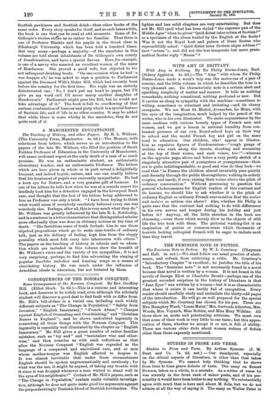The Teaching of History, and other Papers. By H. L.
Withers. (The University Press, Manchester. 45. 6d.)—The Memoir, with selections from letters, which serves as an introduction to the papers of the late Mr. Withers, who filled the position of Sarah Feilden Professor of Education in the University of Manchester, will cause profound regret at the early death of a man of so much promise. He was an enthusiastic student, an enthusiastic elementary teacher, and an enthusiastic Professor. The letters which are here given in whole or in part reveal a delightfully buoyant, and indeed boyish, nature, and one can readily believe that his treatment of pupils was eminently sympathetic. He had a keen eye for Nature, and a very genuine gift of humour. In one of his letters he tells how when he was at a seaside resort his landlady took him for a detective engaged in the Liverpool Bank case, and thought that the fact of his letters being addressed to him as Professor was only a trick. "I have been trying to think what would occur if everybody resolutely believed every one was somebody else. Perhaps, after all, this is very much what they do." Mr. Withers was greatly influenced by the late R. L. Nettleship, and in a sentence in a letter characterises that distinguished scholar more effectually than was done in obituary notices at the time of death. "His fastidious sense of truth forbade him to use those slipshod propositions which go to make nine-tenths of ordinary talk, just as his delicacy of feeling kept him from the sloppy geniality which most folk carry into intercourse with others." The papers on the teaching of history in schools and on educa- tion which are included in this volume show the breadth of Mr. Withers's views and the variety of his sympathies ; it is not very surprising, perhaps, to find him advocating the singing of popular Jacobite melodies and hunting songs as a means of elucidating history. He was much under the influence of Arnoldian ideals in education, but not fettered by them.
CONSEQUENCES OF THE NORMAN CONQUEST.






















































 Previous page
Previous page